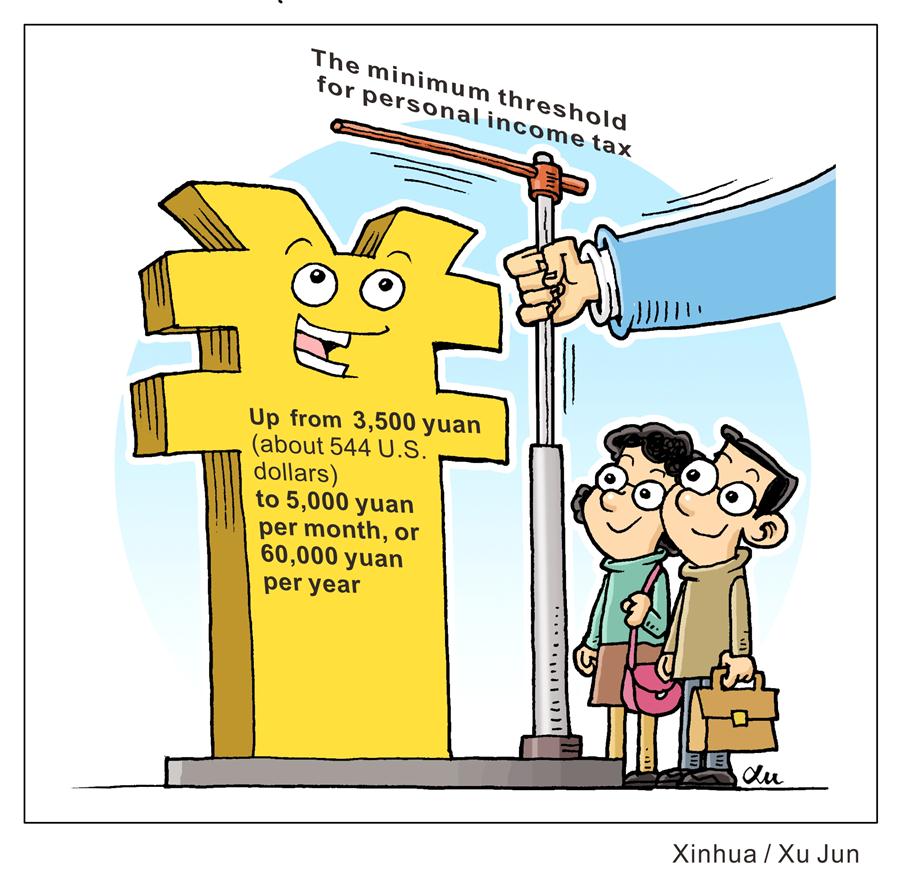


This cartoon shows that China will raise the minimum threshold for personal income tax from 3,500 yuan (about 544 U.S. dollars) to 5,000 yuan per month, or 60,000 yuan per year, as proposed by China's top legislature in a draft amendment to the Individual Income Tax Law on Tuesday. (Xinhua/Xu Jun/Shi Manke)
BEIJING, June 19 (Xinhua) -- China's top legislature Tuesday began reviewing a draft amendment to the Individual Income Tax Law as part of efforts in the country to achieve fairer income distribution and common prosperity.
The draft amendment, submitted for the first reading at a bimonthly session of the National People's Congress (NPC) Standing Committee, raises the minimum threshold for personal income tax from 3,500 yuan (about 544 U.S. dollars) to 5,000 yuan per month, or 60,000 yuan per year.
This standard will also be applicable to those who have no domestic residence but receive an income from wages in China, as well as those who live in China but receive an income from overseas wages.
REVISIONS FOR CONTINUING REFORM
Entrusted by the State Council, Finance Minister Liu Kun told lawmakers at Tuesday's opening of the session that the revisions are aimed at implementing decisions by central authorities and ensuring a smooth individual income tax reform in accordance with the law.
"With this year marking the 40th anniversary of reform and opening up, the revisions focus on content that is no longer suitable for China's continuing reform," Liu said, adding that the changes have taken people's rising consumption expenses into account.
The draft amendment adds special expense deductions for items like children's education, continuing education, treatment for serious diseases, as well as housing loan interest and rent.
"This is the first time that special expense deductions have been introduced in China's individual income tax system," Liu said, adding that they adhere to the basic principles of individual income tax and are helpful for a fair taxation system.
The changes are conducive to reducing tax burdens for taxpayers, raising people's income and boosting consumption.
The amendment defines resident individuals and non-resident individuals as two types of taxpayers. In addition, the length of time used to distinguish between the two groups will be adjusted to 183 days from the previous 365.
"This will help establish tax jurisdictions and safeguard national tax rights and interests," Liu said.
The individual income tax was the third major contributor to China's total tax revenue, following value-added tax and enterprise income tax. In 2017, China collected individual income taxes worth nearly 1.2 trillion yuan, about 8.3 percent of the total tax revenue.
CHANGES FOR EQUITY
The current law has undergone seven revisions since it was enacted in 1980, when the original threshold for individual income tax exemption was 800 yuan per month.
It was raised to 1,600 yuan in 2005 and 2,000 yuan in 2007. The current threshold is 3,500 yuan according to the revision made in 2011.
According to the draft amendment, the previous method of taxing monthly income will be replaced with a new calculation which focuses on taxing annual income.
"The new method will be fairer and more reasonable for those whose monthly salary varies," said Zhang Bin, an expert from the National Academy of Economic Strategy of the Chinese Academy of Social Sciences.
If the revisions are adopted, those whose monthly salary ranges from 5,000 yuan to 20,000 yuan will see their tax cut by over 50 percent and those whose monthly salary ranges from 20,000 to 80,000 will see their tax cut by 10 to 50 percent.
"The personal income tax reform is primarily a good news for middle to lower income groups as people with less income will see a larger tax reduction," said Li Wanfu, head of the institute of tax science of the State Administration of Taxation.
FLEXIBLE TAXATION PREVENTS TAX EVASION
The draft amendment also adds an anti-tax avoidance clause, empowering tax authorities to adjust tax rates when individuals transfer property in violation of independent trading.
Individuals will also be subject to the clause when they evade taxes through overseas tax havens or obtain improper tax benefits by organizing unlawful commercial activities.
"The addition of the clause is meant to let taxpayers pay their taxes in accordance with the law, which is better for the society," Li said.
"Concerted efforts are needed to fix tax evasion loopholes and make taxation more open and transparent," Li added.

 Award-winning photos show poverty reduction achievements in NE China's Jilin province
Award-winning photos show poverty reduction achievements in NE China's Jilin province People dance to greet advent of New Year in Ameiqituo Town, Guizhou
People dance to greet advent of New Year in Ameiqituo Town, Guizhou Fire brigade in Shanghai holds group wedding
Fire brigade in Shanghai holds group wedding Tourists enjoy ice sculptures in Datan Town, north China
Tourists enjoy ice sculptures in Datan Town, north China Sunset scenery of Dayan Pagoda in Xi'an
Sunset scenery of Dayan Pagoda in Xi'an Tourists have fun at scenic spot in Nanlong Town, NW China
Tourists have fun at scenic spot in Nanlong Town, NW China Harbin attracts tourists by making best use of ice in winter
Harbin attracts tourists by making best use of ice in winter In pics: FIS Alpine Ski Women's World Cup Slalom
In pics: FIS Alpine Ski Women's World Cup Slalom Black-necked cranes rest at reservoir in Lhunzhub County, Lhasa
Black-necked cranes rest at reservoir in Lhunzhub County, Lhasa China's FAST telescope will be available to foreign scientists in April
China's FAST telescope will be available to foreign scientists in April